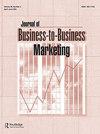Understanding How Salesperson Envy and Emotional Exhaustion Lead to Negative Consequences: The Role of Motivation
IF 2.5
4区 管理学
Q3 BUSINESS
引用次数: 4
Abstract
ABSTRACT Purpose The purpose of this paper is to understand how salesperson motivations can affect negative states such as envy and emotional exhaustion in the workplace. The study uses Social Comparison Theory and Self-Determination Theory to explain how motivation influences the development of envy and emotional exhaustion, resulting in both turnover intentions and unethical selling practices. This study aims to bridge a gap in the burnout and motivation literature by focusing on envy and emotional exhaustion in the salesforce and answering calls for more research on salesperson well-being, envy, and burnout. Design/methodology/approach The study uses a survey research methodology to address the effects of motivation on negative outcomes, envy, emotional exhaustion, turnover intentions, and unethical selling behaviors. Two hundred and eleven salespeople were surveyed to test the hypotheses. Established scales from prior research were adapted for use in the study and met appropriate levels of composite reliability. The model fit statistics met acceptable thresholds specified in the structural equation model literature. The study used a two-step structural equation modeling approach. First, the measurement model was validated using a CFA to test for reliability, unidimensionality, convergent validity, and discriminant validity. Next, the structural model hypotheses were tested using AMOS 27. Next, the serial mediation and moderated serial mediation effects were assessed using the bootstrap method with 5000 bootstraps and a 95% confidence interval. Finally, estimands were created within AMOS 27 to test the indirect and interaction effects in the full structural model. Findings The results show that intrinsic motivation decreases the development of envy, which positively affects emotional exhaustion, turnover intentions, and unethical selling behaviors. The findings show that intrinsic motivation in the salesforce helps to prevent unfavorable comparisons that lead to envy and emotional exhaustion. Thus, sales organizations that nurture intrinsic motivators in the workplace are more likely to prevent salespeople from seeking employment elsewhere and discourage unethical selling behaviors. Additionally, the serial mediation analysis shows that envy and burnout mediate the relationships between intrinsic motivation on both unethical selling and turnover intentions through negative, fully serially mediated relationships. These findings suggest that a sales organization can take action to prevent envy and emotional exhaustion from causing severe problems by implementing intrinsic motivators. Finally, the interaction effects between intrinsic and extrinsic motivation show high levels of extrinsic motivation negate the effects of intrinsic motivation and increase the development of envy, emotional exhaustion, turnover intentions, and unethical selling behaviors. These findings show that sales organizations that invest heavily in extrinsic motivators such as additional pay, bonuses, or commissions should do so with caution to prevent the erosion of the positive effects created by an intrinsically motivated salesforce. Practical implications Sales managers must effectively motivate salespeople to drive performance. When incentive structures are aligned with the motivators of salespeople, good salespeople are happy and are likely to stay in their current roles. Many managers attempt to contribute to their salespeople’s well-being by offering extrinsic motivators such as additional pay, bonuses, commissions, or contests to promote competition amongst sales representatives. However, they must also be careful not to cause unfavorable comparisons to the other salespeople that may cause damage to the organizational culture or salesperson morale. The study provides practitioners with insights into how to reduce envy and emotional exhaustion in their salesforce and provides suggestions for incentivizing intrinsically motivated salespeople when visible competitions, promotions, or campaigns may begin to cause burnout and dark side outcomes in the salesforce. Ultimately, sales managers must be diligent in providing salespeople incentives while preventing unfavorable social comparisons and resentment that can erode a positive sales culture. By cultivating a culture of intrinsic motivation, salespeople can be more focused on personal fulfillment and development, which helps to reduce resentment of other salespeople and ultimately helps to keep a salesforce functioning properly. Originality/value First, the paper’s value stems from its contribution to a better understanding of salesperson motivation and unforeseen issues that arise when the salesperson and the sales organization’s goals are not aligned. We show how sales organizations benefit from matching compensation and incentives with salesperson motivation while minimizing negative effects that emerge through social comparisons that can develop organically. Second, the paper highlights the challenges that sales organizations face when incentivizing their salespeople since sales careers typically attract extrinsically motivated salespeople. Therefore, it becomes even more important to understand the benefits and drawbacks that can afflict a sales team. Third, the paper fills research gaps by examining the effect of intrinsic and extrinsic motivation on the development of envy through social comparisons. Understanding how salespeople develop envy and emotional exhaustion is an important yet under-explored topic. The topic is even more relevant today as more sales teams work remotely, and managers may have difficulty communicating expectations and fostering motivation. Finally, this research synthesizes Social Comparison Theory and Self-determination Theory to help address drivers of salesperson emotional exhaustion and examines the role of motivation in driving these effects.了解销售员嫉妒和情绪耗竭如何导致负面后果:动机的作用
摘要目的本文旨在了解销售人员的动机如何影响工作场所的嫉妒和情绪衰竭等负面状态。该研究使用社会比较理论和自决理论来解释动机如何影响嫉妒和情绪衰竭的发展,从而导致离职意图和不道德的销售行为。本研究旨在通过关注销售人员中的嫉妒和情绪衰竭,并回应对销售人员幸福感、嫉妒和倦怠进行更多研究的呼吁,弥合倦怠和动机文献中的空白。设计/方法论/方法该研究使用调查研究方法来解决动机对负面结果、嫉妒、情绪衰竭、离职意图和不道德销售行为的影响。211名销售人员接受了调查,以检验这些假设。先前研究中建立的量表适用于研究,并符合适当的复合可靠性水平。模型拟合统计量符合结构方程模型文献中规定的可接受阈值。该研究采用了两步结构方程建模方法。首先,使用CFA验证测量模型的可靠性、单维度性、收敛有效性和判别有效性。接下来,使用AMOS 27对结构模型假设进行测试。接下来,使用具有5000条自举和95%置信区间的bootstrap方法来评估串行中介和调节串行中介效果。最后,在AMOS 27中创建了估计,以测试整个结构模型中的间接和相互作用效应。研究结果表明,内在动机会降低嫉妒的发展,嫉妒会对情绪衰竭、离职意向和不道德的销售行为产生积极影响。研究结果表明,销售人员的内在动机有助于防止导致嫉妒和情绪衰竭的不利比较。因此,在工作场所培养内在激励因素的销售组织更有可能阻止销售人员到其他地方求职,并阻止不道德的销售行为。此外,序列中介分析表明,嫉妒和倦怠通过负的、完全序列中介的关系来中介不道德销售的内在动机和离职意图之间的关系。这些发现表明,销售组织可以采取行动,通过实施内在的激励因素,防止嫉妒和情绪衰竭造成严重问题。最后,内在动机和外在动机之间的互动效应表明,高水平的外在动机否定了内在动机的影响,并增加了嫉妒、情绪衰竭、离职意图和不道德销售行为的发展。这些发现表明,在额外薪酬、奖金或佣金等外部激励因素上进行大量投资的销售组织应该谨慎行事,以防止内在激励的销售人员所产生的积极影响受到侵蚀。实际意义销售经理必须有效地激励销售人员提高绩效。当激励结构与销售人员的激励因素相一致时,优秀的销售人员会感到高兴,并可能继续担任当前的角色。许多经理试图通过提供额外的薪酬、奖金、佣金或比赛等外在激励因素来促进销售代表之间的竞争,从而为销售人员的健康做出贡献。然而,他们也必须小心,不要与其他销售人员进行不利的比较,这可能会损害组织文化或销售人员的士气。这项研究为从业者提供了如何减少销售人员嫉妒和情绪疲惫的见解,并为在可见的竞争、促销或活动可能开始导致销售人员倦怠和阴暗面结果时激励内在动机的销售人员提供了建议。最终,销售经理必须努力为销售人员提供激励,同时防止不利的社会比较和怨恨,因为这可能会侵蚀积极的销售文化。通过培养一种内在动机的文化,销售人员可以更加专注于个人成就和发展,这有助于减少对其他销售人员的怨恨,并最终有助于保持销售人员的正常运作。原创性/价值首先,论文的价值源于它有助于更好地理解销售人员的动机,以及当销售人员和销售组织的目标不一致时出现的不可预见的问题。我们展示了销售组织如何从薪酬和激励措施与销售人员动机的匹配中受益,同时最大限度地减少通过有机发展的社会比较产生的负面影响。
本文章由计算机程序翻译,如有差异,请以英文原文为准。
求助全文
约1分钟内获得全文
求助全文
来源期刊
CiteScore
2.20
自引率
35.70%
发文量
22
期刊介绍:
The Journal of Business-to-Business Marketing® encourages diversity in approaches to business marketing theory development, research methods, and managerial problem solving. An editorial board comprised of outstanding, internationally recognized scholars and practitioners ensures that the journal maintains impeccable standards of relevance and rigorous scholarship. The Journal of Business-to-Business Marketing features: •basic and applied research that reflects current business marketing theory, methodology, and practice •articles from leading researchers covering topics of mutual interest for the business and academic communities

 求助内容:
求助内容: 应助结果提醒方式:
应助结果提醒方式:


